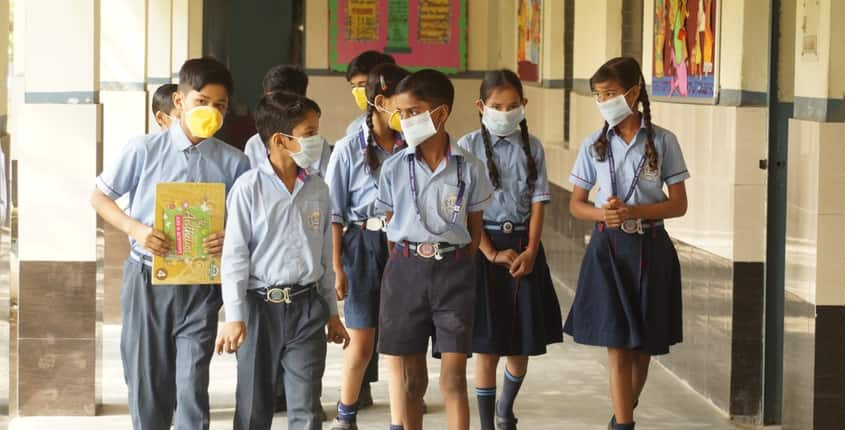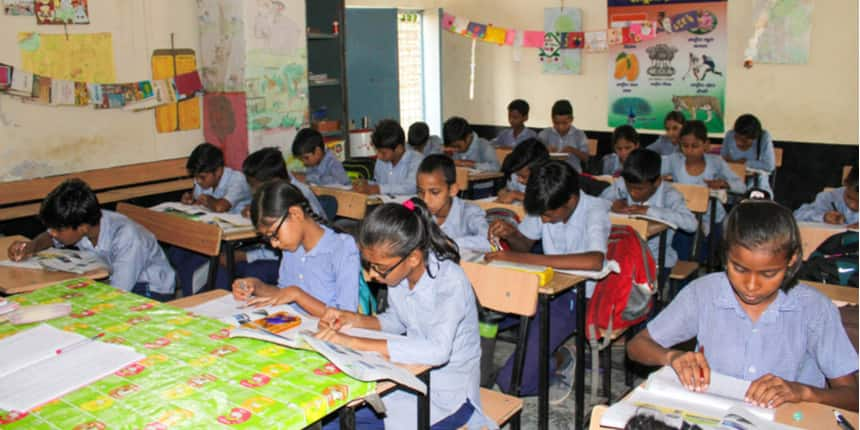With board exams, Haryana shifting blame for systemic failures on children
Atul Krishna | March 15, 2022 | 01:03 PM IST | 8 mins read
Haryana board exams in Classes 5 and 8 are meant to hide state failure to teach, instill fear of failure, and may push students to drop out, say activists.

NEW DELHI: On February 21, following protest from teachers and parents, Haryana chief minister Manohar Lal Khattar announced that board exams for Classes 5 and 8 will not be held from this academic year but the next.
However, this has not allayed the concerns of teachers, parents, school authorities and educationists.
Educationists said that the idea of board exams has been influenced by the regressive notion that only fear can motivate students to learn.
“You are trying to say that you can only teach children with fear. That lies at the foundation of this thought. That the students will go to other schools and write board exams, then the chances of failure are high and then the students will put more effort, teachers and parents will be more active…The whole system’s failure of not being able to teach the students is being put on the children themselves,” said Siddharth Chopra of State Level Education Collective, Haryana.
Large public exams are calculated to hide and distract from the signs of state failure such as teacher vacancies and lack of teacher training.
“The questions of classrooms not being there, teacher vacancies, lack of teacher training all these contribute to non-performance. But to again deviate from this issue is the easy way. You assess them and label them and that is it. Putting the onus on the children and not on the system makes the systemic failures invisible,” said Rita Mishra, founder of Patang, a non-profit working on youth empowerment.
The activists fear that the board exams will cause children to again start dropping out at the elementary level, Classes 1 to 8, in which retention has improved dramatically.
Haryana education minister Kanwar Pal Gujjar, in an address to the Vidhan Sabha in December 2021, said that around 40,000 teaching positions, including that of principals and primary teachers, are vacant across government schools in Haryana.
Haryana Board BSEH, SCERT
The effort to introduce board exams for junior students has been marked by controversy.
After amending the Right to Education rules for the state in 2022, the BJP-led Haryana government announced that all students in Classes 5 and 8, irrespective of the boards their schools are affiliated to, will have to write a common board examination conducted by the Board of School Education Haryana (BSEH) in March this year.
The board also asked private schools to register with the board by paying Rs 5,000 per school and Rs 550 for each student. Private schools moved the High Court of Punjab and Haryana which declared the board’s notices null and void and asked the State Council of Educational Research and Training (SCERT) to conduct the exams.
A few days later, the SCERT declared it didn’t have the expertise to conduct the exam, and transferred the authority back to the BSEH. The next court hearing is scheduled in April.
Board exams for kids
No matter when the exams are held, many schools, parents and academics are opposed to them.
They see the decision as “regressive” and “insensitive”, especially within the context of the pandemic’s disruption of education. Focus should have been on transitioning students back to schooling, not assessment, they argue.
“We have just come out of the pandemic, children have gone through so much psychologically. The idea is how to transition them back to school, make them feel comfortable and then to find out what they have remembered, what is their comprehension level. At this point, introducing board exams is criminal,” said Mishra.
A survey conducted by the Haryana School Shiksha Pariyojna Parishad (HSSPP) found out that around 29,000 students dropped out of school during the pandemic.
A report by the Times of India in July 2021 revealed that 12.5 lakh students enrolled in private schools in Haryana were missing from official records even as government schools reported higher enrolments.
With staggered attendance and schools still operating under COVID-19 protocols, a clearer picture on dropouts is unavailable.
“None of us has performed to our potential. Asking these students – they are going to school after two years and I don’t know what kind of tragedies they and their families have gone through – to appear for board exams is being very insensitive,” said Mishra.
Exams don’t matter
According to educationists, the Haryana government squandered an opportunity to reflect and reform the system.
“During the pandemic we realised that examination is not a big deal. There was internal marking, there were all kinds of other methods. The pandemic gave us an opportunity to reflect and to actually reform but now we have again gone back to board exams,” said Mishra.
Educationists said that the introduction of board exams completely negates the holistic education model proposed in the National Education Policy (NEP) 2020. Many non-scholastic activities, critical for overall development of children, will be neglected with the stress on board exams.
 Schools reported a drop in enrolment in Haryana following pandemic (Source: Shutterstock)
Schools reported a drop in enrolment in Haryana following pandemic (Source: Shutterstock)
“If a student is not good in studies but they are good in sports then the child is getting a lot of recognition from their peers. That will lift their confidence that might help him give more attention to his studies. In board exams, the entire focus will be on the scholastic side. What the child does throughout the year is completely ignored. This is unfair to the child, the system and the teacher,” said Mishra.
Educationists suspect the move might be aimed at reducing the number of students in the subsequent classes to ensure better overall scores.
“I think it is not good for the children, it is definitely great for many teachers, officers, bureaucrats. They get a good rationale to fail children and improve results. If there are few students in the next class, chances of results improving rise,” said Chopra.
Policy Mix-up: RTE Act, NEP, CBSE
School authorities said that the Haryana government’s move is a violation of the Right to Education (RTE) Act, 2009.
“This is a violation of the RTE Act, section 30 (1) which says that no student will undergo any examination till he completes elementary education,” said Anil Kaushik, president, Progressive Private Schools Association, Haryana.
However, the scope for such exams was created by a 2019 amendment to the RTE which scrapped the no-detention policy (NDP). The NDP banned schools from making children in elementary schools (Classes 1 to 8) repeat a grade.
The amended law’s ambiguous language on exams – it allowed “regular examinations” in Classes 5 and 8 without elaborating on their nature – undermined its own ban on public exams in lower classes and prompted many states to consider introducing them. Haryana was one of them and it amended the state RTE rules to that effect.
School authorities maintain the provisions on public exams still hold.“That amendment was to section 16 of the RTE act. That no-detention policy was scrapped. It does not mean that board examinations will be conducted. Even before, there were regular examinations,” said Kaushik. “Section 30 was amended by Haryana which says education authorities have to issue certificates after completion of elementary education. Certificate could be a school leaving certificate or a progress card, it doesn’t say that the students have to undergo specific board examinations.”
Schools also said that Haryana’s decision contradicts the NEP which talks about the creation of an independent, state-wide, body called the State School Standards Authority (SSSA). The SSSA will be tasked to establish a minimal set of standards which shall be followed by all schools.
“The NEP necessitates SSSA to avoid the conflict of interest. First they should make the SSSA then we move forward,” said Kulbushan Sharma, President of Federation of Private Schools Association, Haryana.
Then, authorities of schools affiliated to other boards, including the Central Board of Secondary Education (CBSE), face the challenge of preparing children for an exam based on different teaching patterns and syllabuses.
“Every board’s curriculum is different, teaching patterns are different... Students were taught through online classes. If they force us to teach this curriculum then I don’t understand how the children will cope,” said Kaushik.
“Every school conducts its own examinations till Class 8 then children are assessed. In Class 9 they are registered with the board and the board examinations happen, same thing in Class 11. What they have proposed is not at all feasible,” said Kaushik explaining, “They (BSEH) say that people [schools] who have taken no-objection certificate (NOC) from the director of secondary education, have to register on our portal. If they are registering schools, that means dual affiliation which is not permissible under any law – the Haryana Education Act, nor Haryana Board of School Education Act, nor the CBSE, CISCE bylaws.”
Sharma and the National Independent Schools Alliance, alleged that the “board just wants to accumulate revenue”.
Board exams cover for ‘system’s failure’
“Just like how CCE was removed, like that the no-detention policy has also been removed. I think we are going back on a lot of things especially with respect to our promises with children,” said Chopra, referring to the policy of continuous, comprehensive evaluation (CCE) in the RTE which required children’s learning to be judged on the progress made through the year rather than in one exam. It was to go in conjunction with the NDP, which still exists on paper like the ban on board exams, but has been undermined by the amendment.
According to Mishra, NDP was “misunderstood”. The popular assumption was that children were being promoted without any work. Whereas, even with the NDP, children were assessed regularly, just not held back.
“Assessment is not just a feedback on the children but it is also a feedback on the instruction, whether we are able to reach out to the children or not. In order to do that, we have to realise that the children have not understood the concepts so I need to change the way we teach them,” said Mishra.
“There was no discussion on how to teach students without failing them. There was also no discussion as to whether this is possible or not,” added Chopra.
The more immediate fear is that the introduction of board exams will again push children to dropout at the elementary level.
“Now at least students are reaching Class 9,” said Chopra. “Now those students will leave after Class 5.”
Follow us for the latest education news on colleges and universities, admission, courses, exams, research, education policies, study abroad and more..
To get in touch, write to us at news@careers360.com.